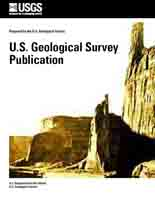Eelgrass habitat near Liberty Bay: Chapter 5
Links
- More information: USGS Index Page
- Document: Report
- Download citation as: RIS | Dublin Core
Abstract
Seagrasses are a widespread type of marine flowering plants that grow in nearshore intertidal and subtidal zones. Seagrass beds are ecologically important because they affect physical, biological, and chemical characteristics of nearshore habitat, and they are sensitive to changes in coastal water quality (Stevenson and others, 1993; Koch, 2001; Martinez-Crego and others, 2008). Zostera marina, commonly known as eelgrass, is protected by a no-net-loss policy in Washington State where it may be used as spawning habitat by herring, a key prey species for salmon, seabirds, and marine mammals (Bargmann, 1998). Eelgrass forms broad meadows in shallow embayments or narrow fringes on open shorelines (Berry and others, 2003). Anthropogenic activities that increase turbidity, nutrient loading, and physical disturbance at the coast can result in dramatic seagrass decline (Ralph and others, 2006).
Suggested Citation
Dinicola, R., 2015, Eelgrass habitat near Liberty Bay: Chapter 5: U.S. Geological Survey Scientific Investigations Report 2015-5125, viii, 110 p., https://doi.org/10.3133/sir20155125.
ISSN: 2328-0328 (online)
ISSN: 2328-031X (print)
Study Area
| Publication type | Report |
|---|---|
| Publication Subtype | USGS Numbered Series |
| Title | Eelgrass habitat near Liberty Bay: Chapter 5 |
| Series title | Scientific Investigations Report |
| Series number | 2015-5125 |
| DOI | 10.3133/sir20155125 |
| Year Published | 2015 |
| Language | English |
| Publisher | U.S. Geological Survey |
| Publisher location | Reston, VA |
| Contributing office(s) | Pacific Coastal and Marine Science Center |
| Description | viii, 110 p. |
| Larger Work Type | Report |
| Larger Work Subtype | USGS Numbered Series |
| Larger Work Title | Hydrography of and Biochemical Inputs to Liberty Bay, a Small Urban Embayment in Puget Sound, Washington |
| Public Comments | A pilot study by the Effects of Urbanization Task of the U.S. Geological Survey Multi-Disciplinary Coastal Habitats in Puget Sound Project |
| Country | United States |
| State | Washington |
| County | Kitsap County |
| Other Geospatial | Liberty Bay, Puget Sound |
| Online Only (Y/N) | N |
| Additional Online Files (Y/N) | N |


